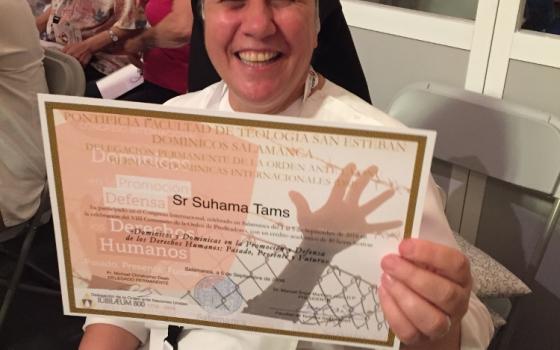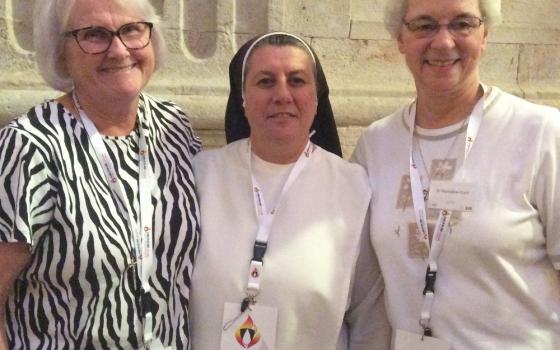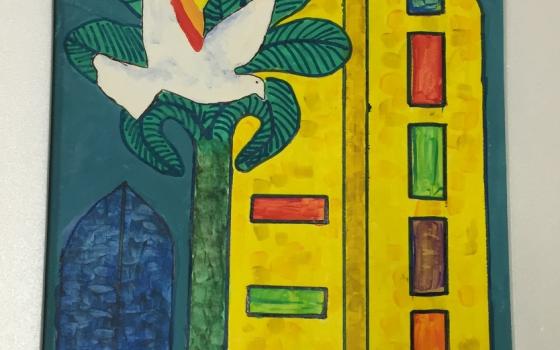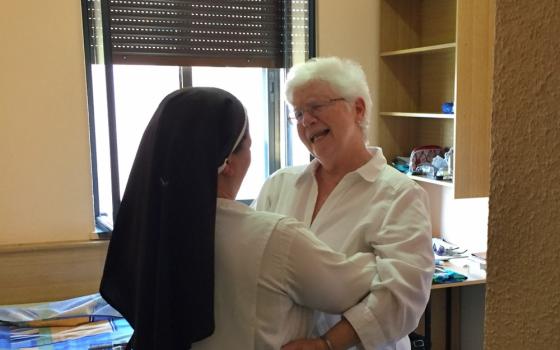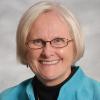In early September, approximately 200 members of the Dominican Family gathered in Salamanca, Spain, for the order's first international congress on human rights.
They came from 50 countries around the world for the congress, which was part of the 800th jubilee year of the Dominican order. It was a time of renewal of friendships as well as struggling together to find the language needed for the order to reimagine and strengthen its justice structures.
Among the participants was Sr. Suhama Tams. I first met Sister Suhama in Kurdistan, Iraq, in January 2015. At the time, she was on the General Council of the Dominican Sisters of St. Catherine, Mosul, Iraq, and ministering in Kaznakan in a newly opened suburb of Erbil for internally displaced Christians. I had an opportunity to interview her while at the congress.
GSR: Why did you come to this human rights congress?
Tamas: I came to participate in the conference to be among the brothers and sisters. I met brothers and sisters who were in Iraq at some time, and it was a good opportunity to reconnect with them.
Can you tell us a little about your ministry in Iraq?
I am working in Kaznakan with 1,000 families. We also work with 130 children in a kindergarten that we established as well as a youth center for about 70 teenagers. We also hold meetings weekly with about 95 women. We teach and give them orientation to help them with their children on how to be friends with their sons and daughters as well as discipline as needed.
We established a clinic for Christians and Muslims.
There are 335 houses rented by the church through the Church in Need and Caritas [programs]. Every house has at least three children and about 20 to 30 people in the house with one bathroom and one kitchen. It is not easy for all these families to be in one house. In our village back in Nineveh plain, we had five or six rooms in our house. But now, we have only one room
How was your family affected by the fleeing of August 6, 2014?
I was in the convent in Bartala, and my family was in Qaraqosh. My family called me in the morning to say they were leaving and to take care of myself. They arrived at 2 p.m. in Erbil.
In Bartala, we waited for our general superior to tell us if we should move or not. She called us at 11 p.m., and she said to follow the people of Bartala. We tried to go to Ankawa, but the streets were crowded, so the policemen told them, 'You can't go,' because ISIS was at the checkpoints. We left Bartala at 11 p.m., and we arrived in Erbil the next afternoon. It took us 12 hours.
We lost the way because it was very crowded. It was about 55 degrees Celsius [130 degrees Fahrenheit]. I had many sisters with me, and they had difficulty with the dust. Every time we thought we were at the checkpoint, it was the wrong way because it was so crowded.
At the checkpoint, they told us, 'You have to leave the car, and you have to walk.' Many times, I went to speak to the policeman: 'We are sisters, and I have older sisters with me.' They didn't make any exceptions.
It was very hard for me when I saw a sick man who was having a very difficult time. He had IVs in his arm, and he was having difficulty walking. We asked if the police would help drive him by car, but no positive answer.
I took my sisters by hand to talk with them. Fortunately, a man saw us and asked his friends, who were Kurdish, if they would help us. The last bus to Ankawa was our bus.
We were seven sisters. Sister Maria called frequently because we kept getting lost. When we arrived, we were with all the displaced persons. All night, we couldn't sleep. We were about 45,000 people. On the second day, there was no place to sleep. We sisters went to different centers to ask for more and more beds. I remember when I went to the sport center, we stayed up until 3 a.m. giving out mattresses. Men and women separated as well as boys and girls. This began our mission for the next few days.
It is better now than in 2014. The people need to have a private life. It is now a big problem because they are eating and sleeping in the same room.
Has your family made a decision to leave Iraq?
My oldest brother has a son who is a doctor. It is a year since he received a salary. So they went to France.
My brother who is an engineer left when ISIS came to Iraq. Another brother spent half of his life in prison in Iran as a result of the Iraq/Iran conflict, and he said, 'I'm not going to spend the rest of my life like this.'
My third brother was in cement work in Mosul, and when ISIS came, he said, 'I don't have children. It is better for me to leave.'
I still have a brother and his family and two sisters, one of whom is handicapped. They don't want to stay in Iraq. They are trying to go to France.
Are you able to communicate with your family in France?
Yes, I can communicate with them. They call me via messenger and Viber. They are happy because their children are in school and there is security and no ISIS. They can sleep without worrying if someone will hurt them.
How do you bring peace to yourself in Iraq?
I have experiences from other situations. I am naturally a happy person, and we are created to be happy. We can't make life unhappy.
When we left everything in Qaraqosh, maybe we accumulated a lot of things in our houses that we didn't need. We left our Christian pictures in Qaraqosh, but since August 6, 2014, I have changed my views on things. I discovered people don't need things to be happy.
If I am happy and I can make you happy, this is the most important thing. No money or houses or pleasure can make me happy. If I am not happy deep within, then no one can make me happy.
Peace cannot come from outside of oneself. I thought, 'I can't allow anyone to disturb my peace or happiness, even when I am tired. I can't be angry or say a bad word to them. It is better to smile with them and make good things with them so that they will learn to live in peace.'
I want to bear the cross with joy. When I think this way, I do well. If I can bear my cross happily, then I am a better witness. In our situation, we don't need theology. People are sad, very sad. But if I see their face, I can change their face through a smile.
What nurtures you or supports you to be happy?
When I am with you, I need to be present to you.
How are the families bridging the conflicts with other families?
Not all the families have problems. Maybe 20 to 25 families have problems.
The priest asks me to go with him to see the families. We call them all in one house and ask them to speak with the family and to share their opinions, and then they understand. They are invited to take time to think about what we talked about and encouraged to come together and to try and work it out. If they don't need us, then they don't call us because they have arrived at peace. Many are grateful that we explain things to them and make it clearer.
Do the people have sufficient food?
Yes, they do. The hygiene is OK. However, many women have cancer, and we need medicines. We need to find money for the women. There are many people who need money. The food, they have, but really all we want is to go home and have peace. I hope we go back one day.
Do you have a special message for Christians in the United States?
I would say, 'Pray for us and help us to fight ISIS and send security to our villages, convents and churches. Otherwise, we cannot make it.'
What else do you want from American people? How can we be present to you?
Maybe the people can press the president to change the situation in Iraq, to stop ISIS from moving forward. Even now in Iraq, there is no culture. Everything is disbanded. The people want professional people. Our people have the good minds. We want to use them here.
What has this congress on human rights done for your spirit?
I really feel the brothers and sisters are with us in Iraq because they tell me they are praying for us. As I meet the brothers and sisters, they look at my name tag and that see that I am from Iraq. 'Sister, you are in my prayers.' It makes me feel like we are one family and we are in the mind of the whole Dominican Family.
Many brothers and sisters were so happy to meet me and said, 'Your presence has been so important here.' It is very touching. For me, it has been a big grace to be here. I met many people and feel I have been with my family.
Thank you.
[Dominican Sr. Durstyne Farnan is director of vocations for the Dominican Sisters of Adrian, Michigan.]
